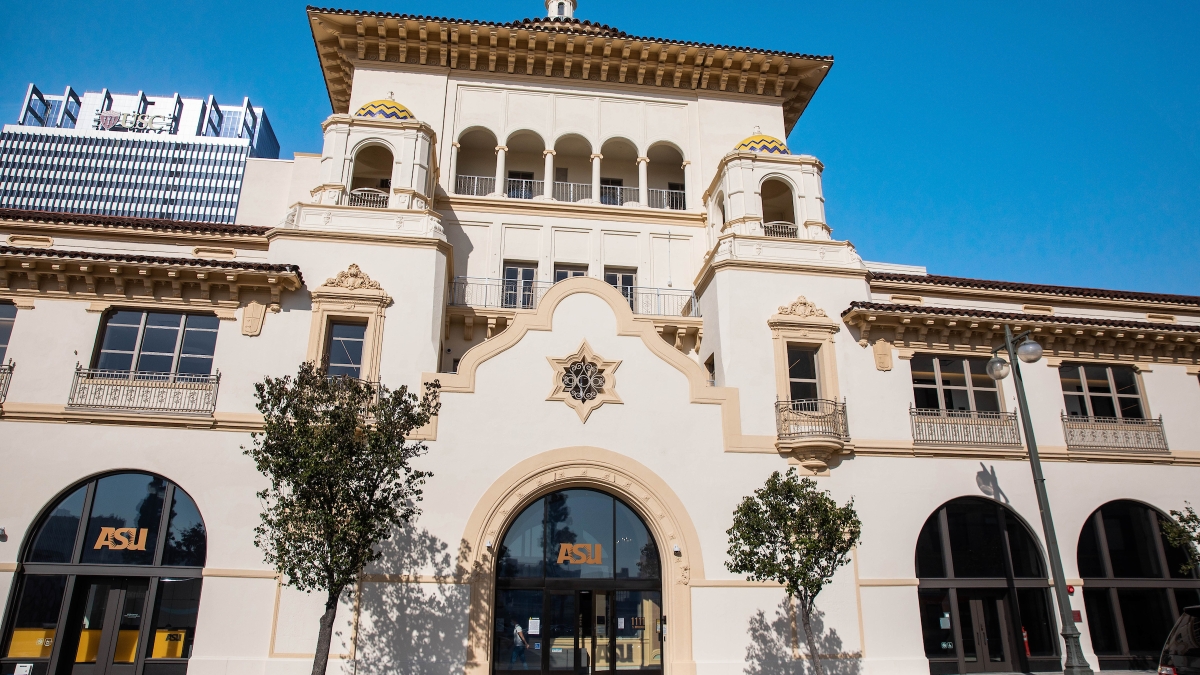Ever wonder if what you say, write or communicate online or in any public forum is still protected by the First Amendment?
These days it can be a tight line to walk, according to an esteemed panel of media scholars and First Amendment attorneys who discussed how we might protect free expression while also protecting our society from the misuse of that freedom during a Feb. 24 live Q&A session from the ASU California Center.
Hosted by Zócalo Public Square in partnership with the Walter Cronkite School of Journalism and Mass Communication, "Does The First Amendment Still Protect Free Speech?" was moderated by Los Angeles Times editorial writer Carla Hall. The panel included legal scholars Jody David Armour of the University of Southern California; Eugene Volokh of the University of California, Los Angeles; media and First Amendment attorney Jean-Paul Jassy; and Cronkite School Dean Battinto L. Batts Jr.
Conversations spanned from cancel culture and Citizens United and their impacts on freedom of speech to the rights and protections of telecommunications and big tech corporations’ under the First Amendment. Panelists agreed that while the speed and modes in which we communicate today have rapidly evolved, media corporations have always been protected.
Batts acknowledged journalism’s pivotal role in democracy and how the Cronkite School embeds objective reporting into all courses. However, he also said that the industry’s model continues to morph.
“Journalism has evolved, and it continues to evolve. The model that we’ve known for such a long time is being objective, covering both sides in fairness. That model still exists, but there is an advocacy journalism model that has emerged that is also very much part of a healthy process,” he said.
Other hot topics on the table were fake news and democracy, cultural revolutions and social movements like Black Lives Matter and #MeToo.
Armour, the Roy P. Crocker Professor of Law at USC, who is an avid free speech defender and an expert in teaching cases involving racial profiling and police, and excessive force issues, said that without the First Amendment, such movements may have never come to fruition.
“I know there would not be a Black Lives movement without freedom of speech,” he said. “You have the movement of our generation and it was made possible by robust protection of First Amendment rights.”
So what about muting voices? Can media corporations like Spotify and Nexflix legally cancel Joe Rogan and Dave Chapelle merely because they don’t like or agree with their content? What about big tech companies like Twitter banning President Trump, and most recently, Meta banning Kanye West for allegedly bullying his former wife Kim Kardashian?
In short, the answer is "yes." In the case of media corporations, the panelists confirmed media and tech powerhouses are indeed protected by the First Amendment to publish or not publish the content they like as privately-owned companies, but in the cases above, it is more of a free market issue than one of free speech.
“These are difficult questions, and they’re not purely legal ones,” Jassy said.
Volokh, a professor at UCLA, asked viewers another tough follow-up question for consideration: “Do you want to be in a position where economically powerful companies decide you are out of bounds, whether it be because we don’t like you or because enough people don’t like you?”
Batts also reminded viewers that free speech and the First Amendment continue to be the underpinnings of this country, and that while not always easy, free speech rights are worth protecting for civil liberties and discourse.
“This thing we call democracy – that we pine for – we have to remember is not a pretty process,” he said. “It’s not a fine dining experience; it’s a food fight, and it should be.”
Top photo: Exterior of the ASU California Center in Los Angeles.
More Law, journalism and politics

How to watch an election
Every election night, adrenaline pumps through newsrooms across the country as journalists take the pulse of democracy. We gathered three veteran reporters — each of them faculty at the Walter…
Law experts, students gather to celebrate ASU Indian Legal Program
Although she's achieved much in Washington, D.C., Mikaela Bledsoe Downes’ education is bringing her closer to her intended destination — returning home to the Winnebago tribe in Nebraska with her…

ASU Law to honor Africa’s first elected female head of state with 2025 O’Connor Justice Prize
Nobel Peace Prize laureate Ellen Johnson Sirleaf, the first democratically elected female head of state in Africa, has been named the 10th recipient of the O’Connor Justice Prize.The award,…
